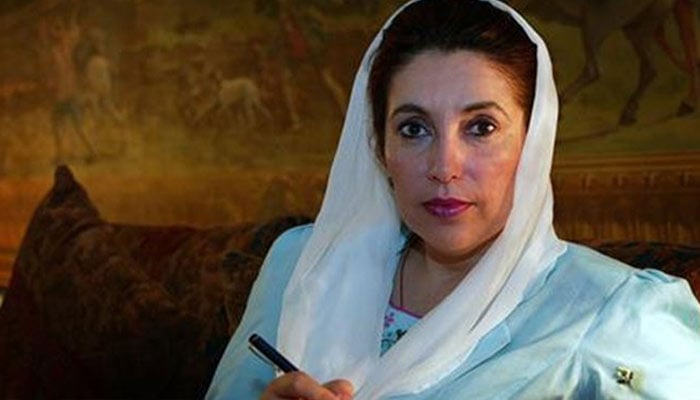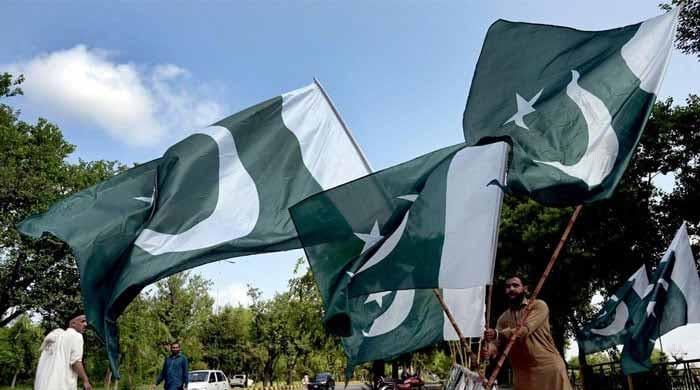Echoes of Benazir: Legacy left behind
Seventeen years after her assassination, absence of Benazir Bhutto is felt more acutely than ever
December 27, 2024

On December 27, the nation pauses to remember Benazir Bhutto, a towering figure in Pakistan’s history whose life was tragically cut short in 2007.
Seventeen years later, her absence is felt more acutely than ever, as Pakistan continues to grapple with challenges that she once faced head-on with resilience and vision.
The anniversary of her death is not just a moment to mourn but a time to reflect on what Pakistan lost when an assassin’s bullet silenced one of the most courageous leaders of our time.
Benazir was more than a political leader — she was a symbol of hope, a beacon of change, and a testament to the indomitable spirit of women in a patriarchal society.
As the first woman to lead a Muslim-majority nation, she shattered countless glass ceilings, standing tall in a world dominated by men. Her journey, however, was not an easy one. It was marked by personal sacrifices, political betrayals, and relentless opposition.
Yet, through it all, Benazir remained unyielding, her eyes fixed on the promise of a better Pakistan. Her assassination on that fateful day in Rawalpindi was not just the loss of a leader but the extinguishing of a dream — of a Pakistan where democracy could thrive, where women could walk shoulder to shoulder with men, and where the principles of justice and equality could prevail.
One cannot help but wonder: what would Pakistan look like today if Benazir were still here? Would we have seen a stronger democracy, a more united nation, and a society more willing to embrace progress?
Benazir was not just a politician; she was a visionary. Her policies were often ahead of their time, focusing on education, healthcare, and women’s empowerment. She believed in a Pakistan where every child, regardless of gender or class, could have access to opportunity.
She was acutely aware of the challenges that plagued the country, from poverty to extremism, and she approached these issues with a clarity and determination that few could match.
But Benazir’s legacy is not just about what she achieved — it is also about what she left behind. Her children, Bakhtawar, Bilawal, and Aseefa, are living embodiments of her values and resilience.
In Bakhtawar, we see the boldness of a woman unafraid to speak her mind. In Bilawal, we see the budding leadership of a young man who has taken up his mother’s mantle, navigating the treacherous waters of Pakistani politics with a strength reminiscent of her own. And in Aseefa, we see the charisma and compassion that were hallmarks of Benazir’s personality. Together, they carry forward her legacy, proving that while Benazir may be gone, her spirit lives on.
Her children’s training is a testament to the strength and foresight of a mother who, even amidst political turmoil, never lost sight of her role as a parent.
She prepared them for a world that would not be kind, teaching them to stand tall in the face of adversity. And today, they honour her memory not just with words but with actions, striving to create the Pakistan that she envisioned.
Benazir’s life was a study in contrasts. She was a leader who wielded immense power but never lost touch with the struggles of the common people. She was a woman of privilege who fought for the underprivileged. She was a politician who understood the art of compromise but never compromised on her principles. And above all, she was a mother, a daughter, and a patriot who gave her life for the country she loved.
Benazir's vision for a progressive Pakistan under the Pakistan Peoples Party (PPP) was rooted in inclusivity, empowerment, and unity. She championed the rights of ethnic minorities, advocating for their representation and protection in a nation often fractured by divisions. Her policies prioritised youth empowerment, emphasising education, employment opportunities, and political participation to harness the potential of Pakistan’s younger generation.
Benazir’s leadership also sought to bridge provincial divides, fostering a sense of unity among Sindh, Punjab, Balochistan and Khyber Pakhtunkhwa, ensuring that all regions felt included in the national fabric. Under her leadership, the PPP symbolised a Pakistan where diversity was celebrated, and every citizen, regardless of background, had a stake in the country’s future.
As we mark her death anniversary, it is impossible not to feel a pang of regret for what might have been. Benazir’s Pakistan was a vision of hope — a place where progress and tradition could coexist, where the voices of the marginalised could be heard, and where the future was brighter than the past. Her absence has left a void that no one has been able to fill, a reminder of how much we lost on that dark December day.
Benazir once said: "The people who resent me do so because I’m a woman, I’m young, and I’m a Bhutto. Well, the simple answer is, it doesn’t matter that I’m a woman, it doesn’t matter that I’m young, and it’s a matter of pride that I’m a Bhutto." These words encapsulate the essence of her life — a life lived with courage, defiance, and an unshakable belief in her identity.
On this anniversary, let us not only remember her but also recommit ourselves to the ideals she stood for. For in celebrating Benazir, we celebrate the enduring hope of a better Pakistan.
The writer is an MNA and a member of the National Assembly’s Standing Committee on IT. She holds a PhD in law.
Disclaimer: The viewpoints expressed in this piece are the writer's own and don't necessarily reflect Geo.tv's editorial policy.
Originally published in The News









